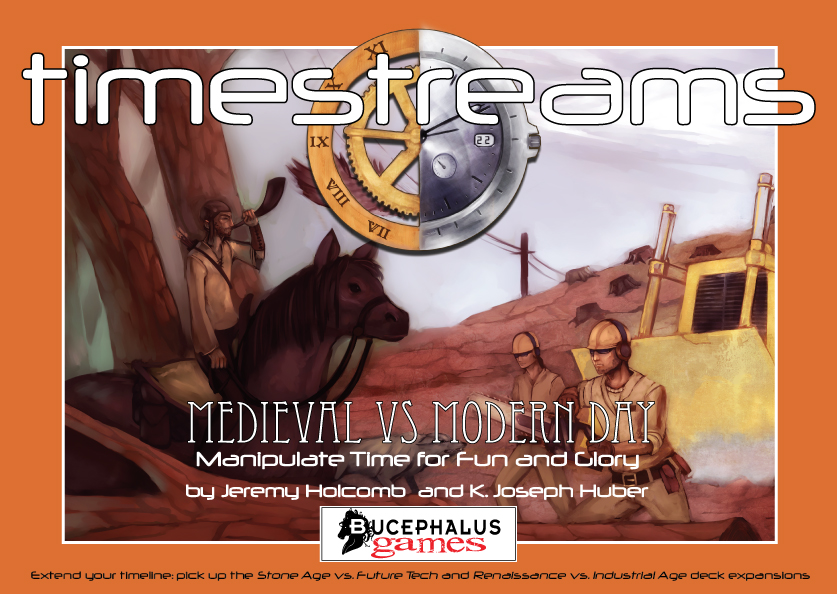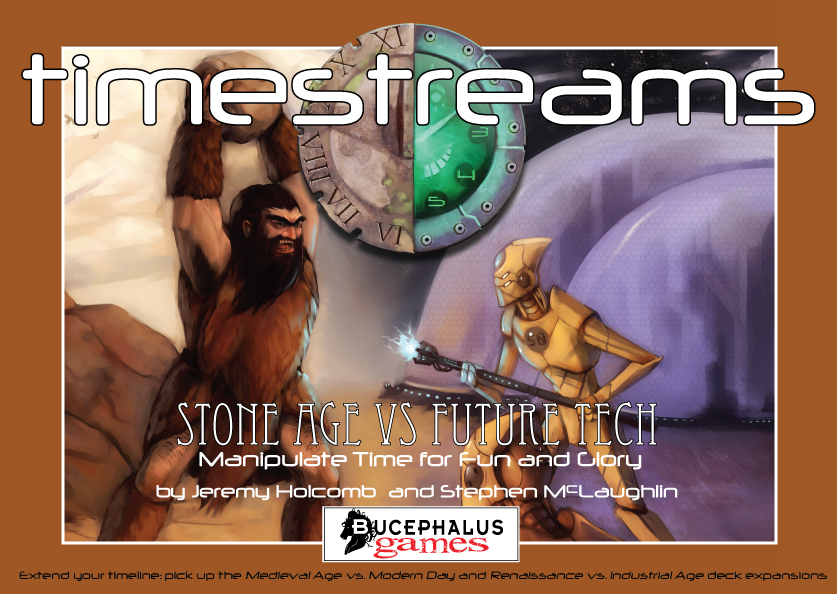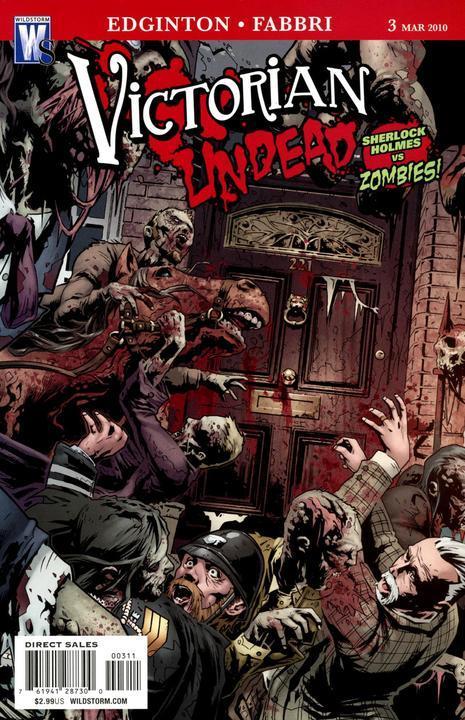
Designed by Jeremy Holcomb and K. Joseph Huber
The Spin: Manipulate Time for fun and glory
The Story: Players play time travelers working their way through multiple eras seeding each with technology designed to shape the world in their image. Two two-player sets (Medieval vs. Modern Day and Stone Age vs. Future Tech) are currently available and at least one more two-player set and some smaller expansions are advertised as on the way. The two-player sets can be combined to expand the game to up to six players.
The Play: Each player is given a deck of cards themed to a particular era. These cards are divided between Inventions and Actions. The Invention cards are worth points at the end of the game while the action cards, mostly, are discarded after their effect takes place.
Before play begins, the players form a tableau consisting of timeline cards representing six eras (Stone Age through Future Tech). Players will begin playing cards one at a time below the Stone Age card. When both players have no more plays they want to make, they move on to the next period. This process continues until the last play in the Future Tech era, at which time scoring it resolved.
When and where Invention cards are played is very important. Inventions have one of two types of effects: Play or Score. Play effects resolve when the card is put into the tableau. Score effects do not occur until the end of the game. Both the Play and the Score effects can destroy inventions, move inventions, alter the values of inventions, and manipulate the players’ hands, decks and discard piles.

When the Future Tech era is complete, players move to the end of game scoring phase. One at a time each era is scored from top to bottom (first six slots only, by default). Again, here cards can be destroyed and values altered. Each era is scored in turn and scores are totaled. Highest score wins. Like many collectable card games, the complexity of Timestreams is in the card interactions not in the game rules.
My Take: I played a lot of CCGs when they first hit the gaming scene in the mid 90s. Magic:TG, Wyvern, On the Edge, Middle Earth, Mythos, INWO—really most of the games released in the first half-decade of the genre. Eventually, I tired of the constant flood of new sets, wonky rule interpretations, and a gaming scene full of over-competitive players. The whole scene was both costly and annoying and I quit pretty much cold turkey (if you will allow me to exclude my brief flirtation with Collectable Miniatures Games). Timestreams fulfills what is left of my CCG craving without the collectible element or the driving force of a tournament scene. Like a CCG, the cards represent tiny alterations to the game’s simple rules and the interaction between the cards and the rules provides plenty of opportunity for tactical play. Though the game is not collectible or (currently) customizable, it does a good job of scratching the CCG itch without giving me a gaming rash. I’d happily lump it in with Blue Moon and Dominion as games that ignore certain CCG elements while playing up others.
Components: Well, it is a card game folks. No wooden bits, no plastic soldiers, no resin tanks. Unfortunately, the card quality is a bit below-average. The cards are too glossy and become hard to read under direct light (hard to photograph also, but that isn’t a problem for you guys). The cards are thick and the glossy coating seems to protect them well from the wear of handling, but the cards do not stand up to a bend test. The card art is solid, but often obscured by the text boxes. I also despised the fonts. The difference between the game text font and the flavor text font is very unattractive.
I also would like to have a board for the timeline instead of using cards. Using cards makes it more portable and likely less expensive, but something like the board for Kosmos/Rio Grande’s Lost Cities would have gone a long way toward making the game more attractive on the table and made the game state easier to see at a glance.
A side note: the flavor text is consistently funny and interesting. Easily the best I’ve seen in a while.
The Verdict. The quibbles with card quality aside (and ultimately they are pretty minor), Timestreams is an enjoyable, highly interactive card game with a fun sci-fi theme and solid mechanics. I recommend it without reservation and could easily raise this score half a point when the final set is released.
7.5/10
 Sunday, April 11, 2010 at 04:43PM
Sunday, April 11, 2010 at 04:43PM  Yes, the title of the comic is Victorian Undead. That's what it promises and that's what you get. I picked up issue 4 then scrambled to find 1-3. The art is super and the story ain't that bad either. Holmes and Watson behave pretty true to character. I admit seeing a very human like automaton threw me a bit in issue one, but by the time armor clad, vulcan machine gun toting soldiers were bursting in to slaughter oodles of zombies, I really didn't mind so much. The comic also has Sherlock's brother Mycroft in an intriguing role, and there's government conspiracy. And you can probably guess who's invovled with the zombie incursion. No, it's not as pschologically jarring as Kirkman's grim and gritty Walking Dead, nor is it a Romero-esque metaphor. Sometimes a zombie is just a zombie and it takes somebody like Sherlock Holmes to get the job done. Victorian Undead (published by Wildstorm) is a wild and wonderful romp through the gaslit streets of London.
Yes, the title of the comic is Victorian Undead. That's what it promises and that's what you get. I picked up issue 4 then scrambled to find 1-3. The art is super and the story ain't that bad either. Holmes and Watson behave pretty true to character. I admit seeing a very human like automaton threw me a bit in issue one, but by the time armor clad, vulcan machine gun toting soldiers were bursting in to slaughter oodles of zombies, I really didn't mind so much. The comic also has Sherlock's brother Mycroft in an intriguing role, and there's government conspiracy. And you can probably guess who's invovled with the zombie incursion. No, it's not as pschologically jarring as Kirkman's grim and gritty Walking Dead, nor is it a Romero-esque metaphor. Sometimes a zombie is just a zombie and it takes somebody like Sherlock Holmes to get the job done. Victorian Undead (published by Wildstorm) is a wild and wonderful romp through the gaslit streets of London. 



